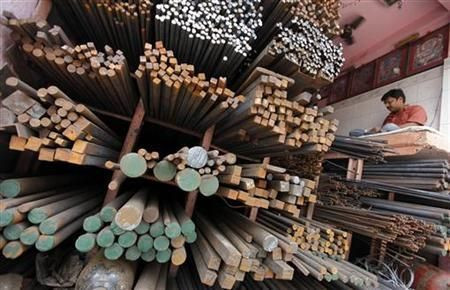In India, A Showdown Between Steelmakers And States

The showdown between one of the world's largest steelmakers and the ore-rich Indian state of Orissa is only the latest in a series of events that have played out in recent years in the subcontinent’s vital mining sector.
Recently, the eastern Indian state slapped 103 mining companies with 670 billion rupees ($12.3 billion) in fines for what it charges is mining in excess of the volumes allowed by the concessions.
This showdown in the steel industry comes at a time when the government is boosting infrastructure development, the kind of business that requires steel.
“The government will have to help those wanting to set up plants that can refine India's iron ore and bauxite reserves,” said an editorial in Wednesday’s (local time) edition of The Times of India.
But from the perspective of steelmakers, the government – or at least a key state government – is doing the opposite.
Under current rules, the only licenses being granted are for so-called captive mining, meaning companies may extract only ore that they cannot export or sell locally to other mining concerns. This has steel manufacturers that lack mining operations, such as Mumbai-based JSW Steel Ltd., which makes steel rods and wires, forced to import more expensive ore from abroad.
"India's iron-ore production will virtually collapse" under the new rules, Basant Poddar of the Federation of Indian Mineral Industries, told Dow Jones Newswires Tuesday, predicting that Orissa’s ban on these ore exports will cause ore shipments to plummet from 60 million tons in the last fiscal year ended March 31 to 25 million tons this year.
On Monday Tata Steel Limited (BOM: 500470) became the latest target of Orissa’s hardline stance. It’s facing a fine in excess of $1 billion for mining more ore than the state’s concession allows. Tata immediately said it would challenge the penalty in the courts, claiming that the state is not making any distinction between illegal mining – extracting ore without a license and without paying taxes – and mining legally but exceeding extraction limits.
Orissa isn’t the only Indian state cracking down on mining. The western state of Goa and Karnataka in the south have also shut mines down in recent months, not just under the premise of curbing what state officials consider illegal mining practices but also due to popular concerns regarding environmental damages. (Goa in particular has a relatively strong citizen-based environmental movement.) Last month Goa's chief minister temporarily suspended all mining operations, an estimated 90 mines, pending an investigation into corruption related to illegal mining and ensuing environmental damages, according to India Times.
Karnataka has recently pulled back on its crackdown, allowing some operations to re-open, according to the Wall Street Journal.
Last year Jharkhand state made an unprecedented decision to allow two steelmakers to sell 20 million metric tons of ore instead of using it to feed their own manufacturing needs, as the concessions rules stated. Out of concern that this would set up a precedent for mining companies to ignore the rules set in place when they acquire licenses, last month New Delhi announced it was banning the practice.
© Copyright IBTimes 2024. All rights reserved.






















